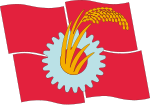Tetsuzo Fuwa
You can help expand this article with text translated from the corresponding article in Japanese. (December 2020) Click [show] for important translation instructions.
|
Tetsuzo Fuwa | |
|---|---|
不破 哲三 | |
 Fuwa in 1967 | |
| Chairman of the Central Committee of the Japanese Communist Party | |
| In office 24 November 2000 – 14 January 2006 | |
| Preceded by | Kenji Miyamoto (1997) |
| Succeeded by | Kazuo Shii (2024) |
| Chairman of the Japanese Communist Party | |
| In office 29 May 1989 – 24 November 2000 | |
| Preceded by | Hiromu Murakami |
| Succeeded by | Kazuo Shii |
| In office 31 July 1982 – 29 November 1987 | |
| Preceded by | Kenji Miyamoto |
| Succeeded by | Hiromu Murakami |
| Member of the House of Representatives | |
| In office 29 December 1969 – 10 October 2003 | |
| Constituency | Tokyo proportional representation block |
| Personal details | |
| Born | 26 January 1930 Nakano, Japan |
| Political party | Japanese Communist Party |
| Occupation | Politician and staff of the political party |
Tetsuzo Fuwa (不破 哲三, Fuwa Tetsuzō, born 26 January 1930 in Tokyo) is the pen name of Kenjiro Ueda (上田 建二郎, Ueda Kenjirō),[1] a member[2] and the former chair of the Japanese Communist Party.[3] He is a graduate of Tokyo University.[4] He joined the Communist Party in 1947, and was elected to the House of Representatives in 1969.[1]
Career
[edit]By around 1972, Fuwa was being placed in positions of higher authority over some other senior party members as part of the JCP's attempts at changing its image and courting younger voters, with the Asahi Shimbun remarking on Fuwa's "eloquency, gentle manner and good looks" in connection to the JCP's electoral strategy. Fuwa was one of the figures in the party who were instrumental in leading the charge to shift the JCP's public image from that of a violent revolutionary group to a reformist and democratic one.[5]
Fuwa eventually become chairman of the JCP from 1982 to 1987; he held the position again from 1989 to 2000. He was president of the Central Committee from 2000 to 2006. Fuwa declined to seek reelection in the 2003 Japanese general election, ending a career in the Diet that lasted over 30 years.[1] As of the JCP's 28th party congress in January 2020,[update] he remains a member of the party standing committee and presidium.[6] He stepped down from the party's executive committee upon the resignation of his successor, Kazuo Shii, in 2024.[7]
He advocates scientific socialism[8] and believes that socialism should be achieved through stages.[9]
References
[edit]- ^ a b c "Communist chief draws veil on long Diet career". The Japan Times Online. 15 February 2003. Archived from the original on 14 April 2021. Retrieved 5 April 2020.
Fuwa, whose real name is Kenjiro Ueda, joined the party while he was in high school and started working at its headquarters in 1964.
- ^ The Great Soviet Encyclopedia (1979)
- ^ "JCP Chief highlights Vietnam's success in 20 years of renewal". 16 January 2017.
- ^ Stokes, Henry Scott (14 October 1979). "Japan's Communist Party Has Some Fine Old Italian Styling". The New York Times.
- ^ Dixon, Karl (1972). "The Growth of a "Popular" Japanese Communist Party". Pacific Affairs. 45 (3): 387–402. doi:10.2307/2756509. ISSN 0030-851X.
- ^ "中央委員会の機構と人事(第28回党大会)" [Structure and personnel of the Central Committee (28th Party Congress)]. Japanese Communist Party (in Japanese). 18 January 2020. Archived from the original on 6 December 2022.
- ^ Kobayashi, Ken. "Shii steps down as Communist Party head after 23 years". Asahi. Asahi Shimbun. Retrieved 19 January 2024.
- ^ Lev, Michael A. (27 March 1996). "In A Fiercely Capitalist Society, Japan's Communists Gain A Voice".
- ^ Tetsuzo, Fuwa (27 August 2002). Lenin and the Market Economy (Speech). Chinese Academy of Social Sciences.
External links
[edit]- On North Korean Question Archived July 24, 2007, at the Wayback Machine
- Asia, Africa and Latin America in the Present-day World Archived November 21, 2023, at the Wayback Machine
- Breaking Japan's Diplomatic Stalemate
- Three Missing Points in Arguments for Constitutional Revision
- Marxism and the 21st Century World
- 85 Years of the Japanese Communist Party and the Present Stage of Development

